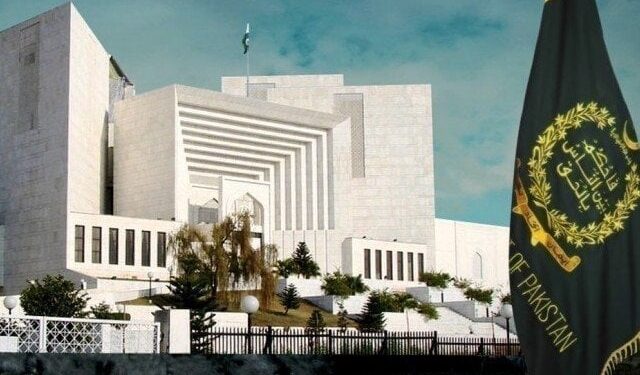Islamabad: The Supreme Court of Pakistan, while hearing a case related to the protection of minorities, reiterated that the judiciary is no longer in a position to run the government. Justice Jamal Khan Mandokhel, a member of the five-judge constitutional bench, remarked that there was a time when courts were forced to intervene in governmental affairs, but that era has passed. “We are not here to run the government,” he asserted.
Supreme Court’s Stance on Judicial Intervention
A five-member constitutional bench, led by Justice Aminuddin Khan, was hearing the minority protection case when the issue of state responsibility and judicial interference came under discussion. Justice Mandokhel emphasized that the judiciary’s role is to interpret and uphold the Constitution, rather than taking over executive functions. He acknowledged past instances where courts had to step in due to governance failures but made it clear that such practices should no longer be the norm.
Concerns Over Church Burning in Jaranwala
During the hearing, a minority leader raised concerns over the lack of arrests in the Jaranwala church burning incident. He expressed frustration that the primary suspects responsible for the attacks had not yet been brought to justice. Advocate Faisal Siddiqui, representing the petitioner, argued that although some suspects had been named, many were granted bail, highlighting flaws in the investigative process.
In response, Justice Naeem Akhtar Afghan pointed out that there are appropriate legal forums available to challenge bail decisions and that the Supreme Court cannot interfere in trial proceedings at this stage. The bench emphasized the need for the concerned parties to pursue justice through established legal channels rather than seeking direct intervention from the apex court.
Comparisons with the Indian Judiciary
Advocate Faisal Siddiqui compared the role of Pakistan’s Supreme Court with that of India’s, particularly referencing the Babri Masjid case. He noted that while the Indian Supreme Court legitimized the controversial ruling on the mosque’s demolition, the Pakistani Supreme Court had not made any such politically charged rulings in 2014. His comments underlined the importance of judicial neutrality and non-interference in politically sensitive matters.
Justice Mandokhel responded by stating that the issues raised by the petitioner were already included in the National Action Plan (NAP), a framework established by Pakistan’s government to counter terrorism, hate crimes, and religious intolerance. He reaffirmed that the judiciary respects its role within the constitutional framework and that any systemic issues should be addressed through legislative and administrative means.
Government’s Role and International Perception
Punjab’s Additional Advocate General, Waseem Mumtaz, stated that discussions on such issues often gain traction at the international level, influencing Pakistan’s global standing. He noted that the government is actively working to improve the security and protection of minority communities, acknowledging that isolated incidents should not be used as a blanket accusation against the entire state apparatus.
Justice Mandokhel also mentioned the recent tragic train attack, stressing that holding one negligent individual accountable does not justify blaming the entire state. He urged a balanced approach where responsibility is assigned based on evidence rather than broad assumptions.
Adjournment and Future Proceedings
After considering the arguments presented, the Supreme Court adjourned the hearing for five weeks, allowing relevant authorities to make further progress on investigations and legal proceedings related to the minority protection case.
Conclusion
This hearing underscores the judiciary’s evolving stance in Pakistan, emphasizing the need for governance institutions to fulfill their responsibilities without undue reliance on the courts. The protection of minority rights remains a key issue, requiring coordinated efforts from the government, judiciary, and law enforcement agencies. As Pakistan navigates these challenges, maintaining a strong commitment to justice, legal due process, and international human rights standards will be essential.

























